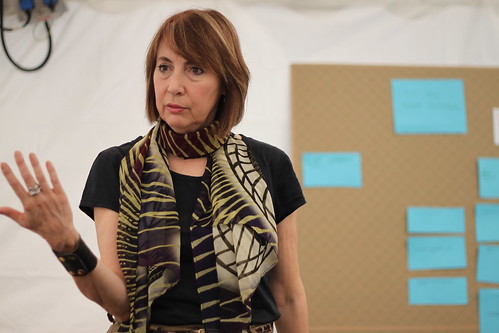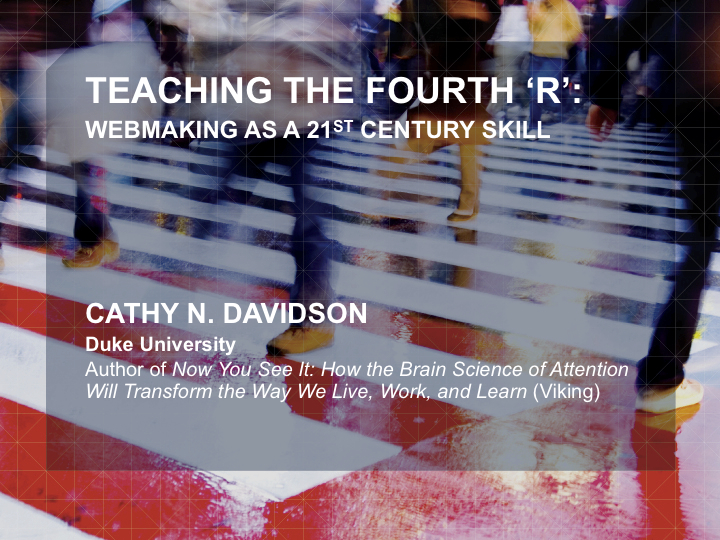Join us for a virtual “fireside chat” with author Cathy Davidson:
Teaching the Fourth ‘R”: Webmaking as a 21st Century Skill
Wednesday, Feb 1 | 9am PST / 12pm EST / 5pm UTC
Sign up on Lanyrd here

How do we teach the web?
You’ve heard of “the three ‘R’s:” reading, writing and ‘rithmetic.
But author and noted academic Cathy Davidson says the 21st Century demands a fourth: “algoRithms,” as in the underlying threads and logic that shape our digital lives.
More than just “teaching people how to code,” Cathy sees “algorhtmic thinking” and webmaking as a vital antidote to the passive, assembly line model that still dominates too much education.
“Algorithmic thinking:” iterative, process-oriented, constructive
As Cathy argues recently in the Washington Post and in her most recent DML blog post:
We need to reform our learning institutions, concepts, and modes of assessment for our age. Now, anyone with access to the World Wide Web can go far beyond the passive consumer model to contribute content on the Web…. That Do-It-Yourself potential for connected, participatory, improvisational learning requires new skills, what many are calling new “literacies.”
Like other literacies, algorithmic thinking is foundational, “a set of rules that precisely defines a sequence of operations.” She sees it as the opposite of the “bubble-thinking” ingrained through decades of highly standardized, multiple choice tests. “It provides an alternative to fact-based mastery and proposes, instead, iterative, process-oriented, constructive, innovative thinking.”
What is marvelous about algorithmic thinking and Webmaking is that you can actually see abstract thinking transformed into your own customized multimedia stories on the Web, offered to a community, and therefore contributing to the Web. Algorithmic thinking is less about “learning code” than “learning to code.” Code is never finished, it is always in process, something you build on and, in many situations, that you build together with others. Answers aren’t simply “right” guesses among pre-determined choices, but puzzles to be worked over, improved, and adapted for the next situation, the next iteration.

Webmaking as art, craft and engineering
Cathy has become an increasingly active part of the Mozilla community. She was a driving force at the 2010 Mozilla Festival on “Learning, Freedom and the Web,” and is one of the lead organizers of the “Badges for Lifelong Learning Competition,” run in conjunction with Mozilla’s Open Badges software.
Cathy’s work at Duke University’s “HASTAC” initiative focuses on the intersection between the humanities and technology. Her interdisciplinary approach feels very Mozilla-ish, especially as we continue to reach out to new audiences and spaces:
The 20th century’s division into “two cultures”—with the human, social and artistic disciplines on one side and the scientific and technological on the other—makes no sense in the world of Webcraft.
In fact, algorithmic thinking is so much about process, invention, and customizing that, in some circles, there is still a healthy debate about whether writing code is an art form, a craft, or engineering. Is it thinking or doing? Is it writing or making? Is it theory or practice? The answer is “all of the above.”
Join us Feb 1
We hope you’ll join Cathy and moderator Mark Surman on Feb 1 to chat about how Mozilla can build on these ideas to create a more web literate planet. See you there!

